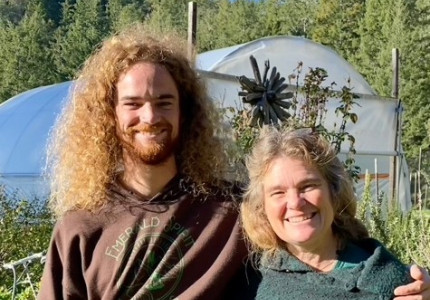Eons and Blackbriar Farms Bring Botanical Expertise to the Cannabis Space Amy and her husband Neil’s life trajectories drew them both to plants.
 Amy grew up in North Carolina and Neil in New Hampshire. “We met at Guilford College 21 years ago,” says Amy. From there, they attended the Southwest School of Botanical Medicine in New Mexico. Amy has a degree in Sustainable Agriculture and Neil is a certified arborist.
Amy grew up in North Carolina and Neil in New Hampshire. “We met at Guilford College 21 years ago,” says Amy. From there, they attended the Southwest School of Botanical Medicine in New Mexico. Amy has a degree in Sustainable Agriculture and Neil is a certified arborist.
“We were fortunate to train with a traditional Appalachian herbalist, learning the flora of the bioregions from New England to South Carolina,” says Amy. “Then, in New Mexico, we shared that knowledge with West Coast students while learning about awesome, resilient desert plants.”
“While living in New Mexico, we met a student from Bell Springs. She invited us to Laytonville. We came out in 2006 as trimmers, living in our Dodge minivan, which barely made it up that hill,” Amy smiles
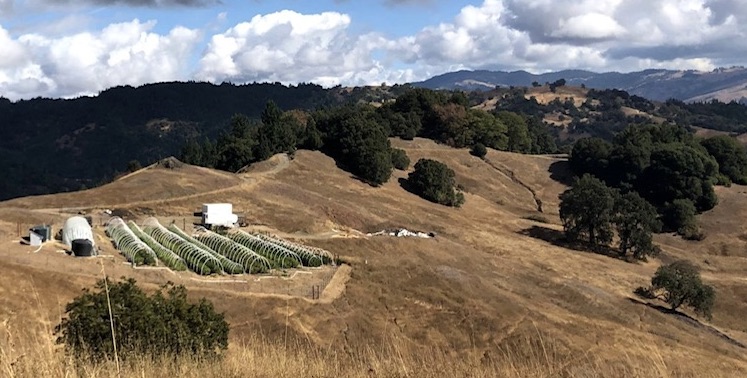
“We trimmed, year after year,” says Neil. But they didn’t limit their productivity to the cannabis space. “We wintered here, working on the homestead- slaughtering steer, hanging huge sections of cows in the barns and building a smoker for about 1,200 pounds of jerky that was marinating in pickle barrels.”
“I had an herbal extract company, making tinctures, salves and doing consultations,” says Amy. Neil continued climbing trees, and over time, they decided to call Mendocino County home.
“We lived on Bell Springs for years. That’s where our son was born,” says Amy. “When we bought our first property, Blackbriar, we thought, ‘The more rural, the better,’” smiles Neil. “It’s in the middle of nowhere. It’s so beautiful. Elkhorn Creek runs through the property year-round.
They purchased Eons Ranch seven years ago. “It’s about 25 miles from Blackbriar and easier for raising our children. The climate is entirely different from Blackbriar, which has cool air from the creek and heavy shade in the fall. Here at Eons, we might have to use shade cloth to reduce sunlight. It’s amazing how the microclimates affect the plants,” says Amy.

Amy notes the similarity between working in small-scale agriculture and cannabis farming. “Back in 2001, I worked mostly on farms that were two acres or less. We’d participate in ‘Know Your Farmer’ events and farm tours. Small-scale farming was a new idea. Farmers were treated like celebrities. It meant something to get into those markets, just like it means something to get into cannabis competitions today.”
Scaling up to manage two separate farms while simultaneously getting them licensed took tremendous energy. Amy and Neil are among the few who have obtained their county license. “We worked on it constantly for years,” says Amy.
“Seven years is not a long time to scale like this, especially coming from the 25-plant Sheriff’s program. It almost killed us,” laughs Neil. “The paperwork, the compliance and the physical work- keeping all that going while not compromising quality was a challenge.”
“Isn’t it a little weird to have the county cannabis office windows papered over, so you have to peek through a slit in that paper to get someone’s attention?” Neil smiles. He attributes the chasm between cultivators and regulators as a holdover from the War on Drugs.
“I’m up at night, thinking, ‘Is my permit going to be revoked? Will my CEQA get approved, so I get my permanent state license?’ This is the new PTSD. Even applying for grant funding was stressful. It took over 40 hours to complete the application.”

Many farmers feel regulators don’t consider the overarching consequences of their rulings.
“When we were getting our LSA for our pond, Fish and Wildlife claimed there was a wetland spring here, which would have been disastrous. The inspector said it in such a nonchalant way. Amy started crying. This is way beyond livelihood.
This is our home. A word from this person takes it all away. People need to understand the magnitude of how overregulation impacts our ability to conduct business,” says Neil.
“In general, the entire process felt combative. We’re perceived as criminals or outlaws that are trying to do the wrong thing,” he continues.
“It’s so heartbreaking,” says Amy.
“Operating a business in a rural location with insane regulations is part of rural knowledge up here,” says Neil. “There are constant supply chain issues. Many people won’t deliver to Laytonville, much less pick up cannabis from your farm. None of our colleagues jumped into this in 2016 to open multimillion-dollar mega-farms.”
Amy notes the cannabis industry is largely responsible for shoring up the county’s economy.
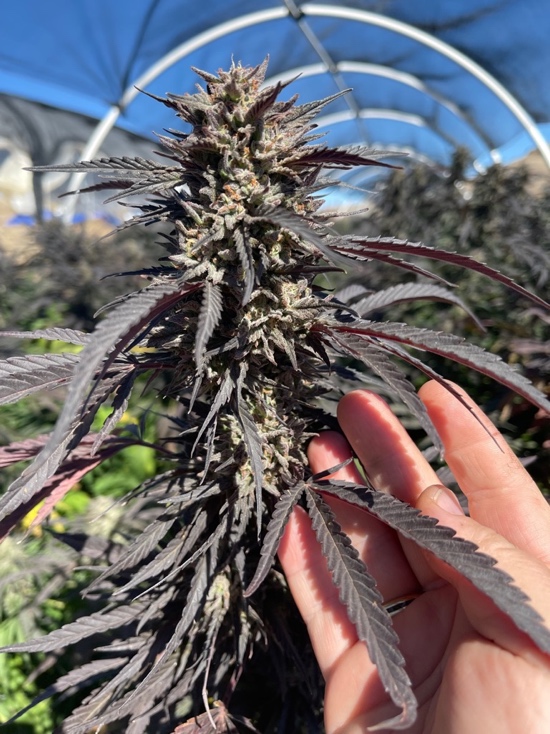
“Some people may have a rude awakening when they realize who’s keeping stores, businesses and restaurants afloat,” she continues, while also recognizing the problem of unlicensed farms.
“There are terrible cannabis growers- not good people, not permanent residents. They arrive in May, poison our water, take their money and leave.” And they certainly don’t pay taxes. “Our farms pay an annual minimum of $50,000 each.”
Their passion for growing excellent cannabis keeps the family happy and sustained. Amy’s plant science background was instrumental in developing superlative strains.
“I wouldn’t call myself a scientist. ‘Bro science’ is what we call it,” she smiles. We’ve mentored with many people. I’m always asking, ‘This is the way you do it- but why?’”
“We’ve returned to creating our own genetics,” says Amy. “We’re dedicating 10-20% of our crop to full-term outdoor seed. We have a huge seed bank. This is the legacy of our area.”
“It’s fun to grow Wedding Cake. They’re beautiful clones. Consumers like it. But I miss seeing and being around the energy of those giant seed plants,” says Amy. “We’re pollinating and sharing some selected strains with friends, expanding the genetic pool. It’s gratifying to see so many strains together.”
“We pop our seeds by the moon and grow in hoops with shade cloth or plastic. It’s a dep style without pulling tarps or lights because we’re outdoor. We’re touching every plant. Every bed is different. The gardens are amended with compost tea, and sheep and chicken manure from our animals. We’re always working toward regenerative practices,” says Amy.
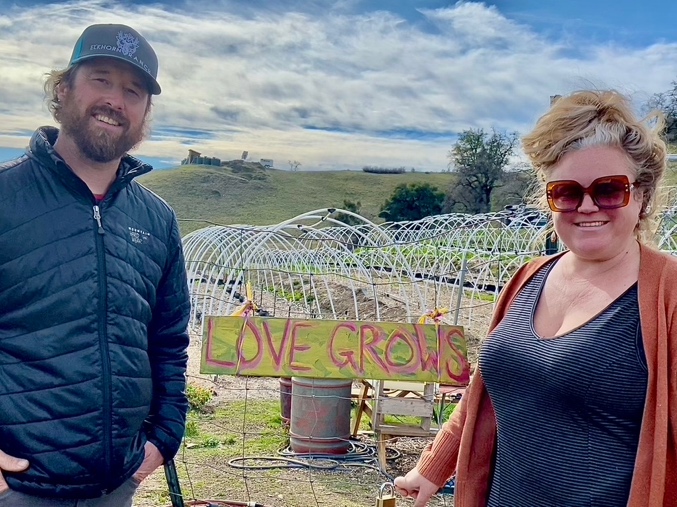
“Our attorney suggested we shouldn’t sell herbal products while getting licensed, so we scaled back my apothecary business,” Amy explains. “It’s still part of what we do and who we are. We’re teaching our kids to identify plants.”
“One day, we’ll arrive at a place where everything works like a well-oiled machine. We’re always juggling this kinetic ball of pieces,” Amy smiles. “But one thing we know: Cannabis works. Plants work. Plants heal people.”
Eons Farm entered Blue Dream in the Kure Mendocino Invitational, and Blackbriar Farm entered Peanut Butter Souffle.


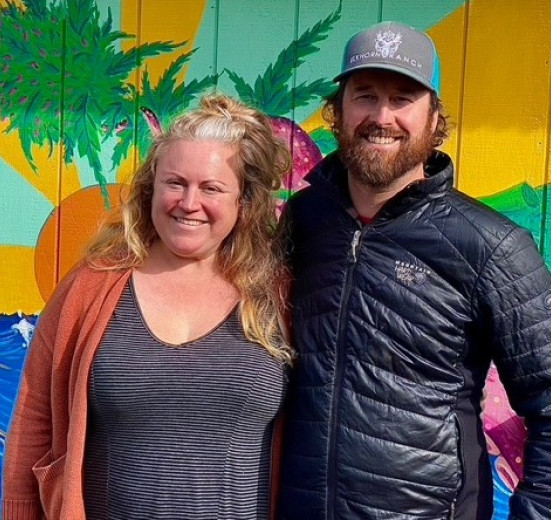

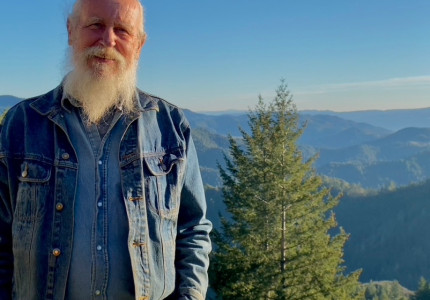
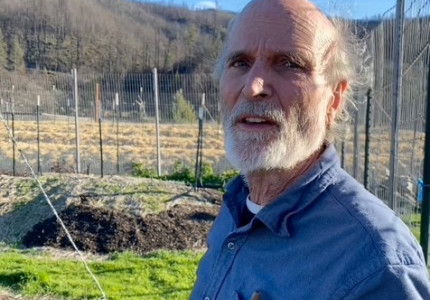
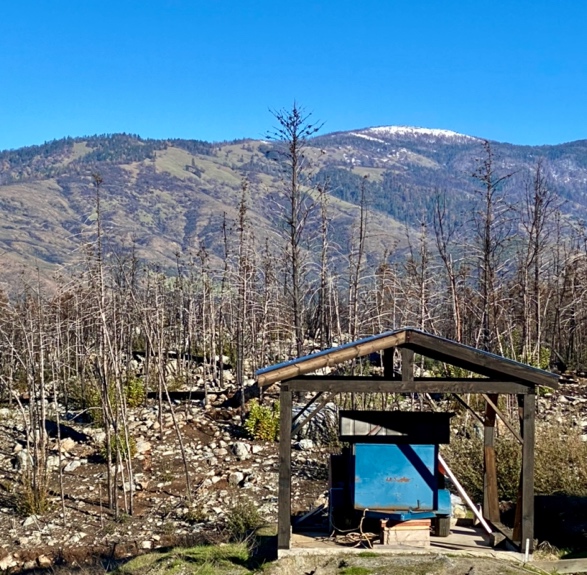 “I’ve only quit smoking three times since 1964,” he smiles.
“I’ve only quit smoking three times since 1964,” he smiles.